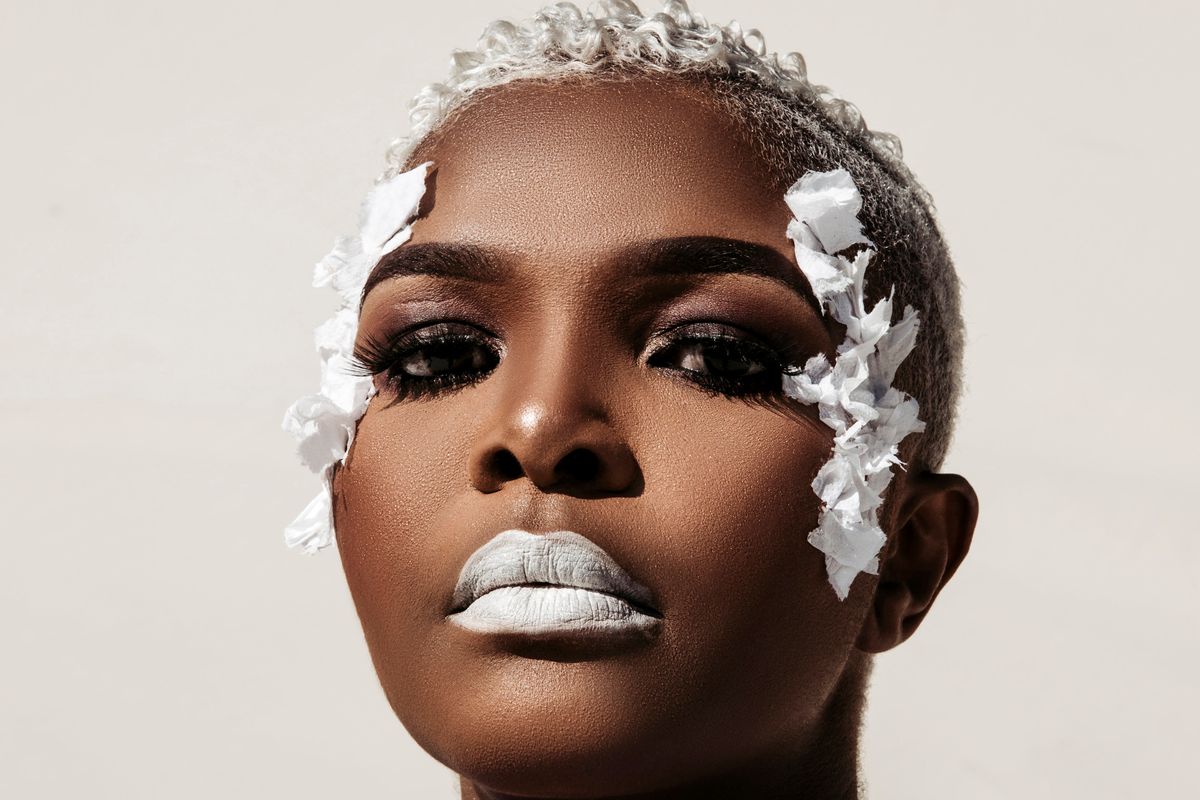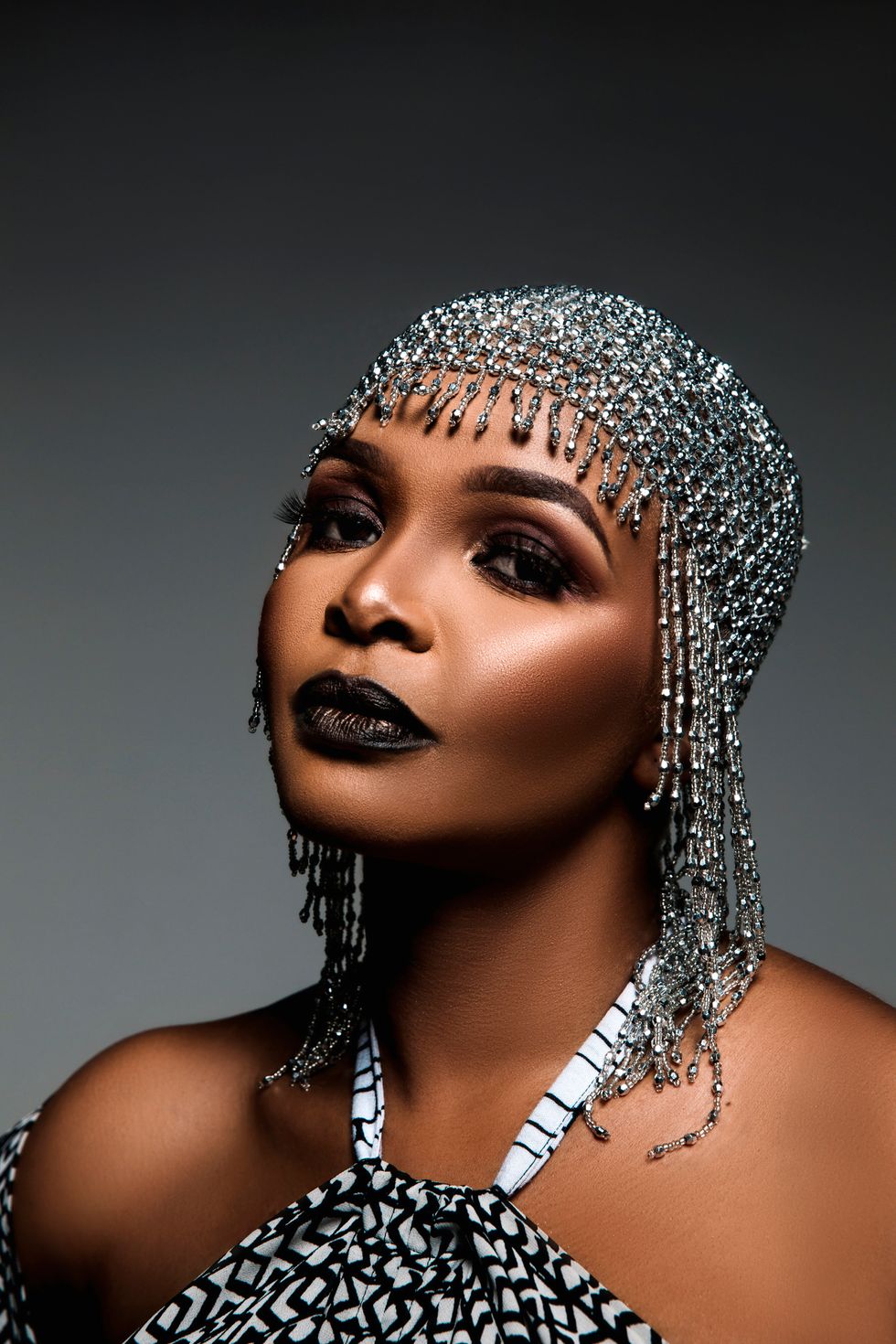Simphiwe Dana's New Album 'Bamako' Lays Bare Her Musical Ingenuity
"I am kind of a genius," says the South African artist about her exquisite new album, an Afro-fusion extravaganza featuring the legendary Salif Keita.

South African Artist Simphiwe Dana releases her latest album 'Bamako'.
Simphiwe Danais without a doubt, one of South Africa's very best musicians. With over a decade in the music industry, Dana has shown her tremendous versatility, mastery of her craft and originality without wavering. There's a reason why Dana has often made her fans wait for long periods of time between album releases. Each album and project has been better than its predecessor
What has made Dana stand out head and shoulders above her peers has been her ability to comment on the human condition and experience in all its complexity. From addressing the political climate of the country and constantly shining a light on the inequalities of South African society to showing vulnerability by sharing with her fans some of her own personal challenges, Dana has more than earned her stripes as a musician.
She's given South Africans timeless hits such as "Ndiredi", "Inkwenkwezi" and "Bantu Biko Street" as well as collaborations with some of the greats. Her latest 13-track album titled Bamako is no different. Largely influenced by the time she spent in Mali's capital city of Bamako, the album is an Afro-fusion extravaganza with an old-school feel to it.
We caught up with the artist to discuss her new album, the creative process behind it, working with the legendary Salif Keita and navigating life as an artist amid the coronavirus pandemic.
This interview has been edited for length and clarity.
What would you say was one of the biggest inspirations behind this particular album?
Well it's actually the same with every album that I do. The reason why I take so long in between album releases is because I want to experience something new, something that I can comment on, whether it's based on my life or the life around me. So my go-to inspiration originally is the human condition, our evolution, how we will get better, how we will heal. So that is my inspiration in a nutshell really.
How would you say this body of work is different to the ones that have come before?
Besides the fact that it was recorded at home and all the vocals are mine and I also produced it not too much really. Obviously, as human beings we are continuously growing. I'm old enough to credit myself for the work that I do now even instrumentally, because [with the albums] Mayine, Inkwenkwezi and Kulture Noir, I did the same thing that I'm doing with this album but I never credited myself. I gave all the credit to other producers instead of saying, I actually initially produced the album instrumentation and then handed it over to someone else.
Walk me through the creative process that went behind the song "Kumnyama".
Well, I was really high on my emotions. It was dark. It was really dark—you know how it goes. I didn't even think that I could see the next day and so it's a song of heartbreak and knowing that it can't be fixed. And also not knowing what to do with yourself. I loved someone really hard but it hurt me really, really bad. But [the song] was the right thing. I needed to just cry and figure it out and then I felt better.

In "Masibambaneni" and "Ndizamile", you feature the legendary Salif Keita. What would you say were just some of the highlights of doing that collaboration with him?
I wanted to feature him in the music but he had to like the song and then say "I want to be on this song". When he heard Masibambaneni, he was like, "What is this song about?" And I said to him that it's calling for African unity and moving forward together. And he was like, "Please get me to the studio right now." He then sent my favorite song from him and as I listened to that song, I was literally almost in tears and in awe. So that's what happened with "Masibambaneni". On the other song he plays the guitar.
In "Mkhonto", which speaks to the armed wing of the ANC, you're asking if the spear is still sharp or going to bring about change. Do you find an answer to that question?
I actually wrote Mkhonto during those Zuma years. The whole of the ANC had become about personality and not about the people, they literally sacrificed everything to just protect this one guy. And hence my question, is it still as sharp or is it blunt like a knobkerrie? And because I sent the song on my SoundCloud, it was doing the rounds even within the ANC. There were those saying, "Guys, let's fix this." And I do believe that, that was part and parcel of how people got the strength to say no [to Zuma].
"I am kind of a genius."
In the album, you seamlessly move between, speaking about the political climate to relationships and heartbreak to fathers not being present in their children's lives. How do you do that?
I am kind of a genius. There's a part of me where I'm also autistic which means my attention to detail is very obsessive in a way. I'm a perfectionist. In many ways, my mind is always racing and I come up with a lot of stuff all the time. The reason why I'm a loner is because I don't really focus much when there are a lot of people around. I think that's part and parcel of autism. I don't think that I'm special or anything, I'm just saying the facts about the person that I am.
Since the beginning of the pandemic, how have you been engaging with your fans following the release of your album?
It's a really uncertain time for musicians particularly, because we make money from crowds. You don't necessarily make money from CD sales but from performing. But that has been taken away from us. However, I also feel like it's a new way to embrace our record labels. Thing is, if you do the whole digital thing, it makes the world very, very small in that you can reach people literally all over the world. So I feel like it is a grand opportunity to go full scale into digital marketing. And that will mean that we may not even need other labels anymore, because right now as someone from South Africa, if I want to enter the Grammys, I have to get a label in the U.S. But perhaps with this kind of marketing, I won't even need that.
Do you feel the Department of Arts and Culture has responded sufficiently to the concerns raised by artists?
Well, I do feel like it has been very inadequate how they have responded. And also thinking of their adjudication team, the age profile is very glaring. Basically, they're not in touch with what is happening today and solutions that would work quickly. That is why in three weeks, they have only managed to go through a few applications and only approved like a hundred. I just feel like, and I think with any other government department in SA, that they need to revamp and get with the times. We are in 2020 and things work differently. We cannot be using the same models that we have been using since 1994.
Listen to 'Bamako' below.
- The 13 Best South African Songs of the Month (March) - OkayAfrica ›
- The 28 Best South African Songs of the Month (April) - OkayAfrica ›
- Here is The Full List of SAMA Nominees - OkayAfrica ›
- Cassper Nyovest, Banky W, Wax Dey, Simphiwe Dana And More ... ›
- Premiere: South African Songstress Simphiwe Dana's 'Time Tough ... ›
- Simphiwe Dana Releases Symphony Experience Concert - OkayAfrica ›
- Simphiwe Dana Shares New Single 'Usikhonzile' from Upcoming ... ›
- 7 South African Female R&B/Soul Artists to Watch In 2020 - OkayAfrica ›
- 15 South African Female Musicians Pushing the Boundaries ... ›
- South African Women Dropped the Best Debuts of 2019 - OkayAfrica ›
- This Is Why Nathi Refuses To Speak English In Interviews - OkayAfrica ›
- Apple Music's 'Stream Local' to Support South African Artists ... ›
- Prince Kaybee, DJ Zinhle & More Earn SAMA Nominations While Master KG, Makhadzi, Ayanda Jiya Get Snubbed - OkayAfrica ›
- 'Bantú Mama' Aims to Unlearn America As the Ultimate Destination of Happiness & Success - OkayAfrica ›
- Artist Martin Senkubuge is Dismantling the Stigma Around Vitiligo - OkayAfrica ›

